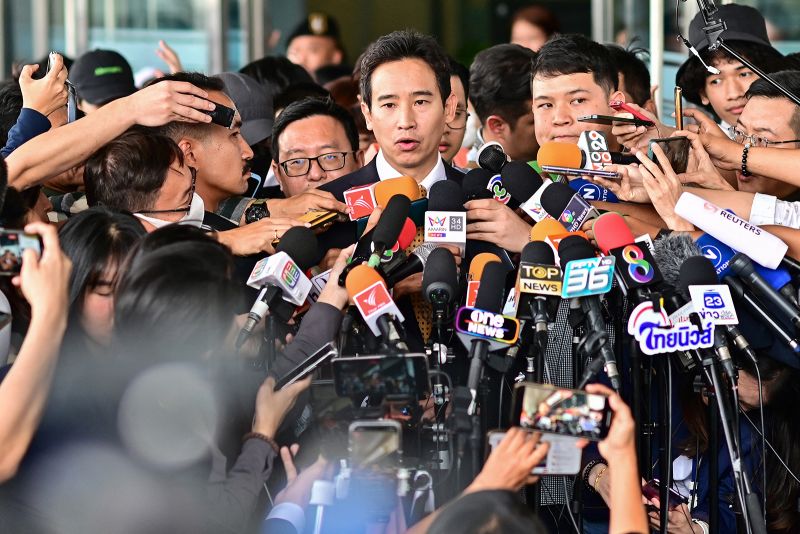
Thai court dismisses media shares case against popular progressive politician – but party’s future still in doubt
A Thai political leader who led his party to a stunning electoral victory on a campaign that threatened to shake up the country’s powerful conservative establishment has escaped being disqualified from politics but his — and his party’s — political future remains in question.
Thailand’s Constitutional Court on Wednesday dismissed a case against Pita Limjaroenrat, 43, that alleged he violated election rules by running for office while holding shares in a media company – the long-defunct broadcaster iTV.
Thai law bans members of parliament from owning or holding shares in media companies.
Eight of the nine-member panel of judges ruled in favor of Pita, saying that since iTV had not operated since 2007 — before he applied for the party-list candidacy — he had not violated the constitution.
The ruling is one of two highly-anticipated verdicts against Pita and the progressive Move Forward Party that could ultimately see Thailand’s most successful party at the last election dissolved, and bans and criminal charges levied at its leaders.
Following Wednesday’s verdict, Pita told reporters outside court that he will continue to work for the people and that he would like to get back to his duties in parliament “as soon as possible.”
“Whenever I’m allowed in, I’ll be there,” he said.
Supporters who had gathered outside the court began chanting “PM Pita,” referring to his bid to become prime minister, and said justice had been done. Some held placards reading, “We will always support the party” while others mocked the Election Commission that brought the case to court.
Supravee Sansuk, 63, from Bangkok said the outcome has restored her faith in the Thai justice system.
Lee Saetung, 69, said he traveled three hours from his hometown of Rayong to attend the verdict.
“I am growing older, I need the country to move forward and we need young people to cultivate the future of my grandchildren. So when the verdict was released, I was very much relieved to see a future ahead for my descendants,” he said.
Besides being defunct for nearly two decades, iTV did not have a media license nor a frequency band to broadcast, and had no income, Pita said in a Facebook post last year.
Pita said he inherited shares owned by his late father but they held “no economic value” and the company was delisted from the Thai Stock Exchange in 2014. The shares were later transferred, he said.
The former prime ministerial hopeful was suspended from his duties as a lawmaker and member of Thailand’s parliament in July while the case was being investigated.
His Move Forward party gained a huge following among young Thais during the 2023 general election for its reformist platform, which included deep structural reforms to how Thailand is run, including to the military and radical plans to amend the country’s strict lese majeste laws despite the taboo surrounding any discussion of the royal family in Thailand.
Move Forward won the most seats and the largest share of the popular vote in the May election.
The result was a decisive victory for progressive parties and delivered a crushing blow to the conservative, military-backed establishment that has ruled on and off for decades, often by turfing out popularly elected governments in coups.
The party was prevented from forming a government, however, as it failed to win support from a big enough majority of parliamentarians over its royal reform agenda and Pita resigned as leader of the party, which is now in opposition.
Move Forward and its former leader Pita remain popular, especially among younger Thais who have hit the streets in huge numbers in recent years calling for political and royal reform.
A January opinion poll by the National Institute of Development Administration showed Pita as being Thailand’s most popular politician for 39% of respondents, with Prime Minister Srettha Thavisin at 22%, Reuters reported.
But its fate hangs in the balance until the Constitutional Court delivers another ruling on January 31 over whether Pita and the party sought to overthrow the monarchy through his election campaign to amend the kingdom’s notoriously strict lese majeste law.
Previous cases
Thailand’s turbulent political history has previously seen parties that have pushed for change run afoul of the powerful conservative establishment – a nexus of the military, monarchy and influential elites.
Lawmakers have faced bans, parties have been dissolved, and governments have been overthrown. Thailand has witnessed a dozen successful coups since 1932, including two in the past 17 years.
And the purportedly independent election commission, anti-corruption commission and the Constitutional Court are all dominated by members in favor of the establishment.
In 2008, the Constitutional Court ruled that then-prime minister Samak Sundaravej violated the constitution by taking part in a cooking show on TV while in office for which he received a nominal fee, and was ordered to resign.
Three parties linked to billionaire political scion Thaksin Shinawatra – the populist former prime minister who was ousted in a coup in 2006 – have been disbanded in the last decade.
And most recently, Move Forward’s predecessor, the Future Forward Party, won the third most seats in the 2019 election. Shortly afterward, several of the party’s leaders were banned from politics and the party was later dissolved after a court ruled it had violated electoral finance rules.
The decision to dissolve the popular party ignited youth-led protests that swept across Thailand in 2020, politicizing a whole new generation of activists and political leaders – some of whom contested last year’s election with the Move Forward Party.
